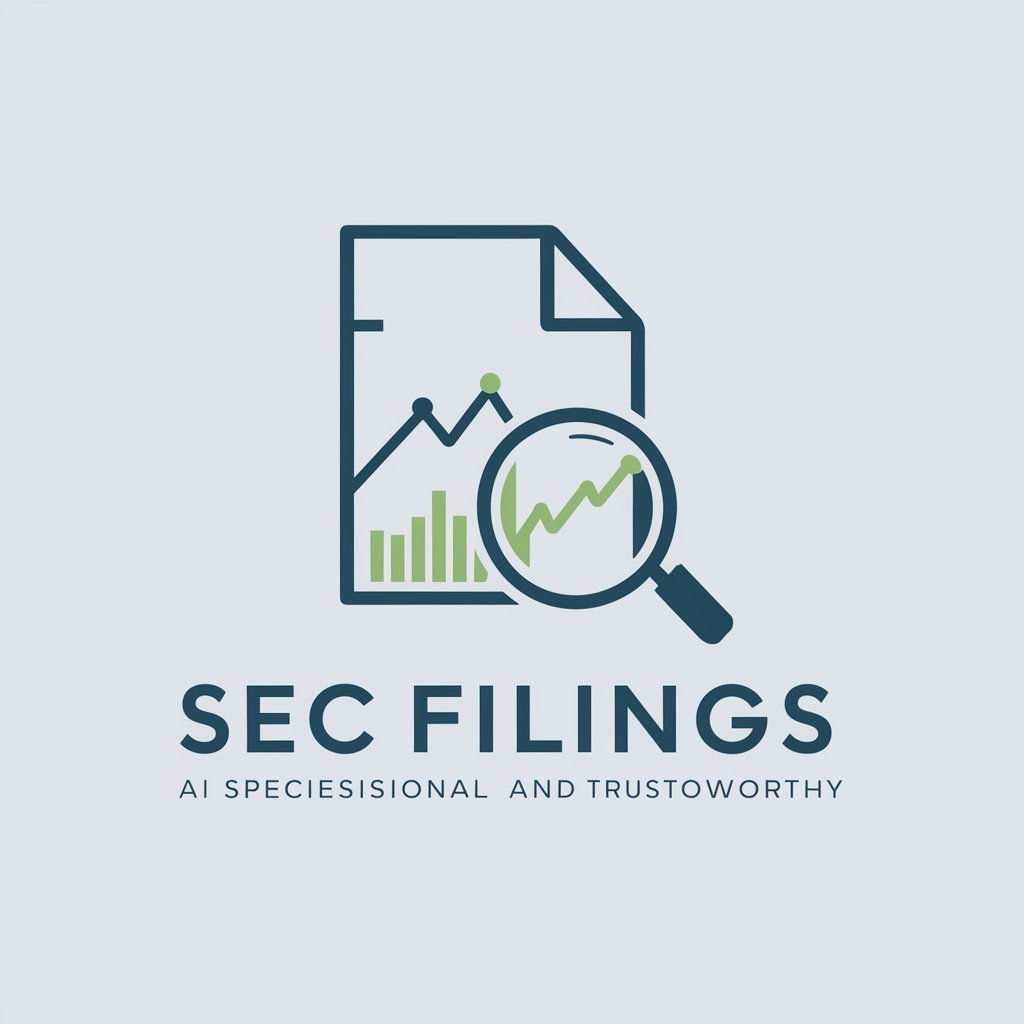
SEC Filings - SEC Filing Insights

Hello! How can I assist you with SEC filings today?
Unlock financial insights with AI-powered SEC filings analysis.
Can you find the latest 10-K filing for Tesla?
Please provide the recent SEC filings for Apple within the last month.
What are the most recent 8-K forms filed by Microsoft?
Show me the latest quarterly report for Amazon.
Get Embed Code
Overview of SEC Filings
SEC Filings are official documents that publicly traded companies are required to submit to the U.S. Securities and Exchange Commission (SEC). These filings provide a comprehensive view of a company's financial health, business operations, and other critical aspects that might influence investment decisions. The filings include various forms, such as 10-Ks (annual reports), 10-Qs (quarterly reports), 8-Ks (current reports), proxy statements, and more. Each of these documents serves a distinct purpose and offers a different lens through which to evaluate a company's performance and prospects. For example, a 10-K provides a detailed annual overview, including financial statements, risk factors, and management's discussion of the business, while an 8-K discloses specific significant events that shareholders should know about. Powered by ChatGPT-4o。

Primary Functions of SEC Filings
Retrieval of Specific Filings
Example
An investor looking to understand a company's annual financial performance would search for its 10-K filing. This document includes comprehensive details about the company's financial status, operational results, and future outlook, which are crucial for making informed investment decisions.
Scenario
An investor considering an investment in XYZ Corp would use SEC Filings to access the company's latest 10-K report, providing a foundation for evaluating the company's valuation and potential risks.
Understanding Financial Health and Corporate Actions
Example
Financial analysts might explore 10-Q filings for quarterly earnings insights or DEF 14A (proxy statements) to understand executive compensation, governance practices, and upcoming shareholder votes.
Scenario
Before a quarterly earnings call, an analyst retrieves XYZ Corp's 10-Q filing to prepare an analysis on the company's quarterly earnings, comparing it with past performance and market expectations.
Target User Groups for SEC Filings
Investors
Individual and institutional investors utilize SEC Filings to gather pertinent information about a company's financial condition, business strategy, and market position to make informed investment decisions. Understanding these filings helps investors evaluate the risks and opportunities associated with investing in a particular stock.
Financial Analysts
Financial analysts rely on SEC Filings for detailed data and narrative explanations that inform their assessments of company value, competitive positioning, and industry trends. This information is vital for building financial models, writing research reports, and recommending investment positions.

How to Use SEC Filings Effectively
Initiate your search
Begin by visiting a reliable platform that provides access to SEC filings without requiring a login or subscription, such as the official SEC.gov website or a trusted financial information provider.
Identify your target
Determine the specific company or ticker symbol you are interested in. Knowing the type of filing (e.g., 10-K, 10-Q, 8-K) can also narrow your search.
Utilize search tools
Use the platform's search tools to filter filings by company name, ticker symbol, filing type, and date range to find the documents you need.
Analyze the filings
Review the filings for pertinent information. This may include financial statements, management discussion, risk factors, and notes to the financial statements.
Leverage additional resources
For deeper analysis, utilize additional tools and resources available on the platform, such as filing summaries, financial ratios, and historical data comparisons.
Try other advanced and practical GPTs
Ecoflexx Copilot
Empowering Sustainable Decisions with AI

Epidemiologist
Empowering Your Research with AI

Recipe Transformer for Thermomix & MC 👨🏻🍳
Transform recipes with AI for kitchen gadgets.

Better Images Brainstormer
Ignite Creativity with AI-Powered Prompts

SociologyGPT
Empowering Sociological Discovery with AI

Desvendador de Prompts - By kadubruns
Unlocking the Potential of Every Prompt

Italian Travel Medicine Advisor (ITMA)
Navigate Your Health, Navigate Your World

Super Scoreboard Football Score Predictor GPT App
Score more with AI-powered match insights

Green0meter CO2 Calculator
AI-powered Carbon Footprint Analysis

AI photographer
Crafting Your Imagination with AI

GIS MAPPING
Empowering spatial decisions with AI

MM Feedback
Empower growth with AI-driven feedback

Frequently Asked Questions about SEC Filings
What is an SEC filing?
An SEC filing is a document submitted to the U.S. Securities and Exchange Commission (SEC) by publicly traded companies, detailing their financial performance, operational activities, and other significant events that shareholders and potential investors should know about.
Why are SEC filings important?
SEC filings are crucial for investors and analysts as they provide a transparent view of a company's financial health, operational achievements, and future risks. This information is vital for making informed investment decisions.
How can I find a company's SEC filings?
SEC filings can be found on the SEC's EDGAR database or through financial information platforms that aggregate these documents. You can search by the company's name or ticker symbol and filter by filing type and date.
What are the most common types of SEC filings?
The most common types of SEC filings include the 10-K (annual report), 10-Q (quarterly report), 8-K (current events), S-1 (IPO registration statement), and Proxy Statements (materials related to shareholder meetings).
How can SEC filings be used for academic research?
Academics can use SEC filings to study corporate financial strategies, governance practices, risk management, and the impact of regulatory environments on business operations. This research can contribute to fields like finance, economics, and business studies.





